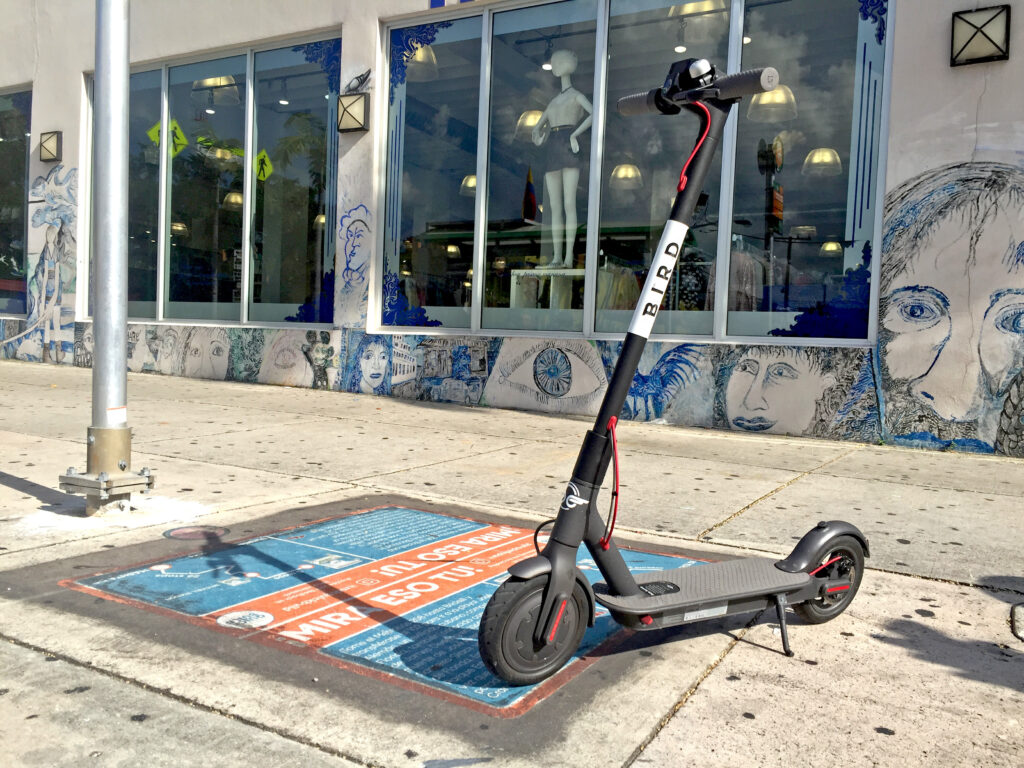Dockless scooters are in Florida, and that’s a good thing. Here’s why.

There’s walking, there’s bicycle riding, and now, dockless electric scooters are joining the ranks as the latest option in urban micromobility.
However, like anything new that challenges existing conventions, they are embroiled in controversy.1 Dockless scooter op-eds fill Twitter and Facebook, while journalists have been prolific in sharing the social media bombast as the “scooter scourge” – to the delight of those who share the same opinion.2
Unfortunately, we have also seen a few walking and bicycling advocates3 parallel this same attitude.
While we firmly believe there is no excuse for a rider – whether on a scooter or bicycle – to tear down a sidewalk at any speed that could put a pedestrian at risk,4 we do think the outright vilification of electric scooters outright is terribly misguided.
To paraphrase the character of Anton Ego in Disney’s animated film, Ratatouille: “The new needs friends.”
If one looks past stereotypes (and understands that local government does have the ability to make smart policy and regulatory decisions that can support dockless services), one will see a transportation option just waiting to be put to use; one that can provide another first-mile/last-mile option to complement the bicycle.
Let’s look at the situation from a blank slate.
Like bicycles, scooters bridge the speed gap between walking and driving. Most dockless scooters are capped at 15mph5 – just a bit faster (or slower) than someone bicycle commuting6 – and near enough to the speed of bicycle riders that slowing down around others does not require an outright panic stop. Likewise, the space necessary to maneuver a scooter is not much different, and their footprint is smaller than most bicycles.
…as a vehicle of small size and weight, dockless scooters – like bicycles – can provide yet another alternative to motor vehicle use in the city, and thus reduce severe crashes between human beings and two tons of needlessly dangerous machinery careening about our cities at 30 miles an hour.
As such, motorized scooters are suited to the same protected bike lanes that currently dominate the conversation of safe, urban bicycle infrastructure – certainly more so than “speed pedelec”7 e-bikes, at any rate.
Considering that these bike lanes not only serve bicycle riders but also provide an alternative when sidewalks fail people using wheelchairs and mobility scooters (to be clear – a nationwide issue, not just in Florida), the pairing is a natural fit. This is not to say protected bike lanes are by any means a substitute to proper ADA compliance in the first place, but their existence provides a much safer fallback than ostensibly “sharing the road” with cars when a curb is insurmountable or a sidewalk is completely impassable.
As much as we love bicycles, we must admit the scooter might have a stronger mass appeal in the long run. Unlike bikeshare, motorized scooters conjure up an image of effortless transportation, free of pedaling and sweat. While this allure may irk public health advocates hoping to increase physical activity through cycling, one must consider that scooters can be a public health benefit from a long-term, holistic standpoint.
Update: Upon the National Association of City Transportation Officials’ (NACTO) first year of compiling scooter share data, scooter rides outpaced traditional docked bike share (38.5 million e-scooter trips vs. 36.5 million on docked bike share) and exceeded dockless bike share trips by 12 times.89
For one, scooters encourage less automobile dependency in the city for short trips, thus reducing the possibility of automobile-involved crashes and overall emissions (depending, of course, on a city’s size, scooter popularity, and the most common types of trips made in that region). Second, by providing the infrastructure and opportunity for scooter users, opportunities (by virtue of said shared infrastructure) open up for bicycle riders as well, making the active option more inviting.
Of course, this is textbook incrementalism, but by working off a popular platform (the scooter), political will and community support for active transportation could be gained much quicker than by advocating for bicycles alone.
But there is one problem.
The current Florida law prohibits scooter use in much of the public realm. Enacted into law in 200610, Florida Statute 316.2128(1)11 bans motorized scooters – dockless or otherwise – from both streets and sidewalks:
“A person who engages in the business of, serves in the capacity of, or acts as a commercial seller of motorized scooters or miniature motorcycles in this state must prominently display at his or her place of business a notice that such vehicles are not legal to operate on public roads, may not be registered as motor vehicles, and may not be operated on sidewalks unless authorized by an ordinance enacted pursuant to s. 316.008(7)(a) or s. 316.212(8).”
This is in addition to a pre-existing statute, 316.1995,12 which sets forth restrictions on motorized vehicle use on bicycle paths and sidewalks. The following is the current version, amended in 201013 to include exceptions for golf carts and motorized wheelchairs:
“(1) Except as provided in s. 316.008 or s. 316.212(8), a person may not drive any vehicle other than by human power upon a bicycle path, sidewalk, or sidewalk area, except upon a permanent or duly authorized temporary driveway.
(2) A violation of this section is a noncriminal traffic infraction, punishable as a moving violation as provided in chapter 318.
(3) This section does not apply to motorized wheelchairs.”
These statutes came to a head in late June, when the City of Miami required dockless companies to pull their scooters from the streets14 due to the existing law – despite being at odds with the mayor’s own point of view:
Totally agree! Working on sponsoring legislation w the commission to legalize and regulate them. Am a big fan. Think they are revolutionizing the way we move. Private sector innovation.
— Mayor Francis Suarez (@FrancisSuarez) June 21, 2018
Thus, scooters are a Catch 22 in Florida until both 316.2128 and 316.1995 are revised by the State.
Update: Florida HB453 proposes to add a new section under 316.003 defining scooters under a new vehicle category, “Micromobility Device.” Revisions to 316.1995 and 316.2128 are part of the proposed legislation as well.15
Since then, Mayor Suarez has stated on Twitter that the city is drafting legislation to propose their use, while Coral Gables beat the entire state to the finish line as the first city in Florida to issue a permit to a dockless company for scooter operation.
The Coral Gables’ partnership with SPIN is for a six week trial period, ending in August 2018, and the city has the option to discuss options with other dockless companies after the trial period expires.1617
Granted, no article to-date has explained how this trial works within the existing Florida statutes, but we are glad to see these cities take the initiative. Ideally, we hope these combined efforts will influence future legislative changes in favor of micromobility options.
Nevertheless, despite all the benefits, some pedestrian advocates still argue that dockless scooters do not deserve any consideration, as they create obstructions for people in wheelchairs or mobility scooters. Often cited as the exclusive fault of scooters alone, this argument overlooks that our existing sidewalks are frequently unreasonable for wheelchair users, and have been so long before dockless scooters reignited the conversation of space equity. If anything, e-scooters have brought these sidewalk deficiencies back into the spotlight to be rectified.
Thing is, unlike objects cemented or bolted into the ground – which require engineering, planning, and a piece of the infrastructure budget before they move an inch – dockless scooter (and bicycle) obstructions are easily overcome with a simple solution first seen in Seattle18 and now in Austin, Texas – dedicated dockless parking spaces.
We added some new stencils to our street markings collection! Dockless 🚲 & 🛴 will be hitting #ATX streets soon. Our staff installed some dockless parking zones downtown today to encourage people to park dockless 🚲 & 🛴 safely! Learn more: https://t.co/yIyaud9gc6 #ATXundocked pic.twitter.com/m1waF4zQDB
— ATX Transportation and Public Works (@austinmobility) May 19, 2018
A simple solution to a simple problem. If only moving bus stop advertisements, trash cans, light poles, and fire hydrants were as easy as putting down a bit of paint.
But we digress.
The electric scooter could be an excellent part of cities’ transportation mix, if we choose to support them as cities and communities. They fit into a similar mobility niche as bicycles and benefit equally from protected bike lanes; hence, their presence supports the cause for constructing safer infrastructure for bicycle riding. The dockless companies have begun to recognize this too, with Bird offering to create a protected bike lane fund to share with cities where it operates.1920
Additionally, the dockless aspect shines a brighter spotlight on the need to fix inequitable street access outside of bicycle lanes alone.
But perhaps most importantly, as a vehicle of small size and weight, dockless scooters – like bicycles – can provide yet another alternative to motor vehicle use in the city, and thus have the potential to reduce severe crashes between human beings and two tons of needlessly dangerous machinery careening about our cities at 30 miles an hour.
Put simply, there are no major downsides if our cities properly accommodate scooters (and bicycles) with protected lanes and if new legislation legalizes their use in a fair and supportive manner.
The future is in our hands. Let’s create it wisely.
NOTE: In light of the recent letter to the editor from LimeBike to the Miami Herald21, we wish to clarify that the article above and the views expressed herein are exclusively the position of our programs and staff. We did not speak with any company providing dockless scooter services for the purposes of this article, nor have we received any compensation for the points of view expressed herein.
- https://www.curbed.com/2018/6/27/17507250/transportation-scooters-women-bikes-families
- https://medium.com/halting-problem/how-san-francisco-fought-back-against-the-scooter-scourge-42ef133d8794
- An infamous example: https://www.latimes.com/opinion/op-ed/la-oe-jackson-bird-scooter-20180515-story.html
- https://mobilitylab.org/2018/07/16/when-biking-and-walking-get-lumped-together-people-get-hurt/
- Confirmed by Bird in San Francisco after reducing their initial 22mph cap: https://www.sandiegouniontribune.com/news/environment/sd-me-scooter-safety-20180305-story.html
- Given that the speed of a commuter cyclist is highly dependent on area gradients, infrastructure, local cultures’ attitudes towards cycling, and available infrastructure, there is no one study that covers this, nor would any single average be meaningful. Nevertheless, references are as follows:
• Vox Media has compiled Strava Insights data from four major cities in the following article: https://www.vox.com/2015/10/8/9480951/bike-commute-data-strava
• Treehugger’s report on Vélo’v bikeshare in Lyon, France indicates that riders are averaging 10km/h to 15km/h (6.21 to 9.32mph): https://www.treehugger.com/bikes/new-study-shows-urban-cycling-is-faster-than-driving.html
- https://www.treehugger.com/bikes/denmark-allows-fast-and-heavy-speed-pedelecs-bike-lanes-what-were-they-thinking.html
- https://usa.streetsblog.org/2019/04/17/scooter-trips-surpass-bike-share-for-the-first-time/
- https://nacto.org/2019/04/17/84-million-trips-on-shared-bikes-and-scooters/
- https://www.leg.state.fl.us/statutes/index.cfm?StatuteYear=2006&AppMode=Display_Results&Mode=Search%2520Statutes&Submenu=2&Tab=statutes&Search_String=MOTORIZED+SCOOTER
- https://www.leg.state.fl.us/statutes/index.cfm?mode=View%20Statutes&SubMenu=1&App_mode=Display_Statute&Search_String=MOTORIZED+SCOOTER&URL=0300-0399/0316/Sections/0316.2128.html
- 2018 statute: https://www.leg.state.fl.us/statutes/index.cfm?mode=View%20Statutes&SubMenu=1&App_mode=Display_Statute&Search_String=316.1995&URL=0300-0399/0316/Sections/0316.1995.html
- 2009 and earlier statute: https://www.leg.state.fl.us/statutes/index.cfm?mode=View%20Statutes&SubMenu=1&App_mode=Display_Statute&Search_String=316.1995&URL=CH0316/Sec1995.HTM
- https://www.miamiherald.com/news/business/technology/article213523839.html
- https://www.flsenate.gov/Session/Bill/2019/453/BillText/er/PDF
- https://www.miamitodaynews.com/2018/07/10/coral-gables-bars-bike-and-scooter-leasing-takes-a-spin-with-spin/
- https://cheddar.com/videos/spin-enters-florida-steadily-growing-e-scooter-business-by-working-with-cities
- https://usa.streetsblog.org/2018/04/26/pro-tip-for-managing-dockless-bike-share-clutter-give-them-space-on-the-street/
- https://usa.streetsblog.org/2018/08/02/scooter-company-bird-offers-to-pay-cities-to-build-bike-lanes/
- https://www.dmagazine.com/frontburner/2018/08/scooter-company-bird-proposes-donating-funds-to-build-more-bike-lanes/
- https://www.miamiherald.com/opinion/letters-to-the-editor/article214819555.html
